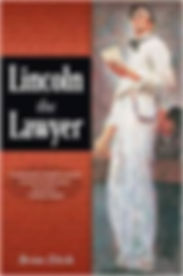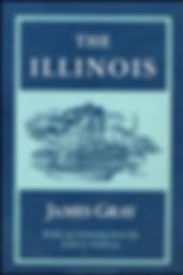Corn Kings and One-Horse Thieves
Odds & ends

Illinois past and present, as seen by James Krohe Jr.
The Corn Latitudes
Wait a Minute
Springfieldians propose being herded by cats
Illinois Times
January 6, 1978
The siren song of city manager government was heard in Springfield in the 1970s. It promised political reform through structural changes to the local system of representation. The plan described here was based on a faulty premise, which is that improving municipal government's representativeness one would improve its effectiveness.
Other reforms were proposed in Springfield during this period, and were the subject of other pieces listed on this page.
One of the gripes most often voiced about Springfield's commission government is that it is remote from the people it is supposed to serve, unresponsive, and unmovable. "Remote" is a vague word—which explains its popularity as a political catchword—and it is impossible to tell exactly what people mean when they use it. Do they mean the government is physically remote? Surely not. Philosophically remote? Possibly, though I find little trace of ideology in this squabble. Culturally remote? Ah, there is something. But the code word for that is ''unrepresentative.''
As far as I can make it out, when people talk about city government being remote they are referring principally to its administrative remoteness. They mean that people are insulated from the sources of decision-making by the city bureaucracy, that the city, acting through its various departments, acts according to its own priorities instead of the priorities of those who elected it, that, in ways unspecified but still deeply felt, government doesn't care. "I didn't have an alderman I could go to with my problems the way I was used to," says one unhappily transplanted citizen, "and city government felt farther away from me because of that."
One remedy being touted by the Citizens for Representative Government (CRG) is an aldermanic government, specifically a ten-alderman council which would hire a full-time professional city manager to take care of the day-to-day affairs of the city. The aldermen under the scheme would be people from the neighborhoods—largish neighborhoods, to be sure, since each ward would encompass some 10,000 souls—and would serve as a link between the individual voter and the government, a conduit of gripes and suggestions, a red tape cutter. The alderman would be more accessible and more accountable (meaning more vulnerable to retribution at the polls) to the voters in the wards than the commissioners elected at large.
But would it work? Under the commission system, in which each council member is responsible for running a specific city department, one's vote counts directly for or against the person running each department. It is small leverage against a person on the council but it is still very real, a political and moral claim to his attention. It is as intimate a relationship between governed and governor as there is.
Under the new system, one's vote would count directly for or against a single alderman (Step One) who in turn casts one of ten votes (Step Two) in the hiring of a city manager who chooses the department managers (Step Three) who actually run things (Step Four). The voter would thus be removed from the source of day-to-day decision-making by four administrative levels.
This distance between the people's man and the decision-makers is no oversight, merely the structural reflection of the system's philosophy. The council acts strictly as a policy-making body, the city's legislature. It has no direct control of the city's administrative machinery. The executive power is invested instead in the city manager, who in turn delegates it to the various department heads. It is at this level, where street lights are mended, alleys patched, trash collected, zoning choices made, in short, where policy is transformed into practice, that the city is made manifest in the neighborhoods. And it is at this level that the neighborhoods' representatives would have no direct authority.
Ultimately gripes would have to be answered by the city manager. A citizen would, of course, be able to take his case directly to the manager, bypassing his alderman. But he has no authority over the manager, no leverage; the difference between dealing with one of the present commissioners and a city manager is the difference between dealing with an elected politician and a bureaucrat. If, however, the citizen takes his problems to his alderman, he is reduced to talking to a man who will talk to the man who will talk to the man in charge.
(Given the nature of most of the complaints of remoteness against the commission system, it occurs to me that it is not a change of government that is needed but an ombudsman system. It is a notion that requires more discussion than I can give it here, so that package must lay unopened for the moment.)
An aldermanic system of local government does not by itself bring people closer to government, not if one means by government the power to get things done. Whatever its virtues in broadening the policy-making process (and they are several) aldermanic government won't do much to remedy what ails most citizens about city government. ●
SITES
OF
INTEREST
Essential for anyone interested in Illinois history and literature. Hallwas deservedly won the 2018 Lifetime Achievement Award from the Illinois State Historical Society.
One of Illinois’s best, and least-known, writers of his generation. Take note in particular of The Distancers and Road to Nowhere.
See Home Page/Learn/
Resources for a marvelous building database, architecture dictionary, even a city planning graphic novel. Handsome, useful—every Illinois culture website should be so good.
The online version of The Encyclopedia of Chicago. Crammed with thousands of topic entries, biographical sketches, maps and images, it is a reference work unmatched in Illinois.
The Illinois chapter of the American Institute of Architects in 2018 selected 200 Great Places in Illinois that illustrate our shared architectural culture across the entire period of human settlement in Illinois.
A nationally accredited, award-winning project of the McLean County Historical Society whose holdings include more than 20,000 objects, more than 15,000 books on local history and genealogy, and boxes and boxes of historical papers and images.
Mr. Lincoln, Route 66, and Other Highlights of Lincoln, Illinois
Every Illinois town ought to have a chronicler like D. Leigh Henson, Ph.D. Not only Lincoln and the Mother road—the author’s curiosity ranges from cattle baron John Dean Gillett to novelist William Maxwell. An Illinois State Historical Society "Best Web Site of the Year."
Created in 2000, the IDA is a repository for the digital collections of the Illinois State Library and other Illinois libraries and cultural institutions. The holdings include photographs, slides, and glass negatives, oral histories, newspapers, maps, and documents from manuscripts and letters to postcards, posters, and videos.
The people's museum is a treasure house of science and the arts. A research institution of national reputation, the museum maintains four facilities across the state. Their collections in anthropology, fine and decorative arts, botany, zoology, geology, and history are described here. A few museum publications can be obtained here.
“Chronicling Illinois” showcases some of the collections—mostly some 6,000 photographs—from the Illinois history holdings of the Abraham Lincoln Presidential Library.
I will leave it to the authors of this interesting site to describe it. "Chicagology is a study of Chicago history with a focus on the period prior to the Second World War. The purpose of the site is to document common and not so common stories about the City of Chicago as they are discovered."
Illinois Labor History Society
The Illinois Labor History Society seeks to encourage the preservation and study of labor history materials of the Illinois region, and to arouse public interest in the profound significance of the past to the present. Offers books reviews, podcasts, research guides, and the like.
Illinois Migration History 1850-2017
The University of Washington’s America’s Great Migrations Project has compiled migration histories (mostly from the published and unpublished work by UW Professor of History James Gregory) for several states, including Illinois. The site also includes maps and charts and essays about the Great Migration of African Americans to the north, in which Illinois figured importantly.
An interesting resource about the history of one of Illinois’s more interesting places, the Fox Valley of Kendall County. History on the Fox is the work of Roger Matile, an amateur historian of the best sort. Matile’s site is a couple of cuts above the typical buff’s blog. (An entry on the French attempt to cash in on the trade in bison pelts runs more than
2,000 words.)
BOOKS
OF INTEREST

Southern Illinois University Press 2017
A work of solid history, entertainingly told.
Michael Burlingame,
author of Abraham
Lincoln: A Life
One of the ten best books on Illinois history I have read in a decade.
Superior Achievement Award citation, ISHS Awards, 2018
A lively and engaging study . . . an enthralling narrative.
James Edstrom
The Annals of Iowa
A book that merits the attention of all Illinois historians
as well as local historians generally.
John Hoffman
Journal of Illinois HIstory
A model for the kind of detailed and honest history other states and regions could use.
Harold Henderson
Midwestern Microhistory
A fine example of a resurgence of Midwest historical scholarship.
Greg Hall
Journal of the Illinois
State Historical Society
Click here
to buy the book
Southern Illinois University Press
SIU Press is one of the four major university publishing houses in Illinois. Its catalog offers much of local interest, including biographies of Illinois political figures, the history (human and natural) and folklore of southern Illinois, the Civil War and Lincoln, and quality reprints in the Shawnee Classics series.
The U of I Press was founded in 1918. A search of the online catalog (Books/Browse by subject/Illinois) will reveal more than 150 Illinois titles, books on history mostly but also butteflies, nature , painting, poetry and fiction, and more. Of particular note are its Prairie State Books, quality new paperback editions of worthy titles about all parts of Illinois, augmented with scholarly introductions.
The U of C publishing operation is the oldest (1891) and largest university press in Illinois. Its reach is international, but it has not neglected its own neighborhood. Any good Illinois library will include dozens of titles about Chicago and Illinois from Fort Dearborn to
Vivian Maier.
Northern Illinois University Press
The newest (1965) and the smallest of the university presses with an interest in Illinois, Northern Illinois University Press gave us important titles such as the standard one-volume history of the state (Biles' Illinois:
A History of the Land and Its People) and contributions to the history of Chicago, Illinois transportation, and the Civil War. Now an imprint of Cornell University Press.




Reviews and significant mentions by James Krohe Jr. of more than 50 Illinois books, arranged in alphabetical order
by book title.
Run by the Illinois State Library, The Center promotes reading, writing and author programs meant to honor the state's rich literary heritage. An affiliate of the Library of Congress’s Center for the Book, the site offers award competitions, a directory of Illinois authors, literary landmarks, and reading programs.
